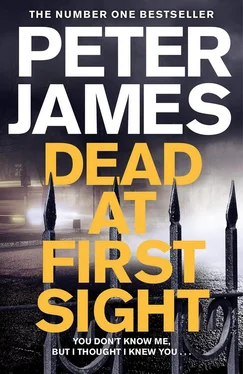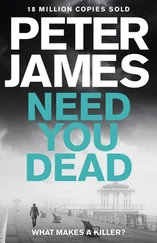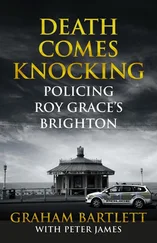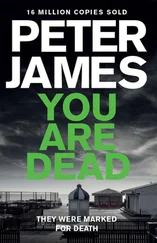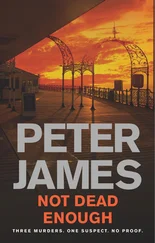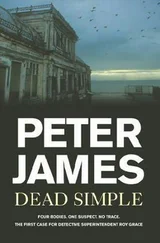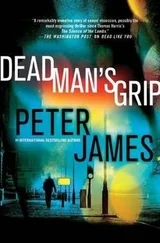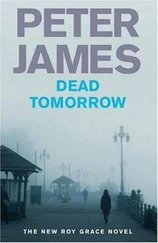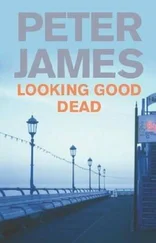Entering the stiflingly warm room, pushing hard as he was told, Grace saw two Crime Scene Investigators on the floor, with gloved hands, doing a fingertip search, one of whom, Chris Gee, he recognized, and CSI photographer James Gartrell, videoing the scene. Above them was a woman in her mid-fifties, with dark hair, dressed in a loose sweater and jeans, hanging from what looked like a bathrobe cord looped round a massive, gilded chandelier. All around the fixing the ceiling was badly cracked, with some chunks of plaster fallen away. Among the debris on the floor was a black velvet slipper embossed with a gold crest. The other was still on her foot.
Her neck looked elongated. Her contorted tongue, dark blue and pink, protruded from her mouth. Her eyes were bloodshot and flat. Her face was blotchy, mottled with green, and there were several early bluebottles gathered around her eyes. Her hands were purple and there was dried foam around her mouth.
Grace held the door, to stop it swinging back, as his colleague entered.
Glenn Branson looked up. Despite recoiling with the shock and horror of what he saw, and the smell, he felt a twist of sadness inside his heart. The same he’d felt each time in his career when he’d attended a suicide. Wondering about the victim’s life, what had led to them taking this terrible step — and who might have been able to talk to them and convince them there were other choices.
Grace was feeling many of the same emotions. He looked at the woman’s eyes, wide open as most hanging victims he’d ever encountered were. Staring. Windows of the soul , he thought.
Unless you fell through a hangman’s trap, breaking your neck, death by hanging was not an instant process. He’d learned this from numerous pathologists’ reports. You would still have some air coming through and could dangle there for a long while, struggling for breath.
Thinking about what you had done? Maybe regretting it?
Where is your soul now, Suzy Driver? he wondered, deeply saddened.
He looked down at the gap between her feet and the chair beneath. Then looked back at her. Thinking. This scene was telling him one thing, but in his mind he was seeing something else. Something not quite right. As if in some meagre form of compensation, he pulled out his phone and took several photographs of her. He knew that Gartrell would cover everything thoroughly, but he still liked to have some photographs of his own to study before the CSI ones were distributed.
Looking up at her again, he thought, This wasn’t your choice, was it? I’m sorry. I know it’s not much comfort, but I promise you one thing: I will do everything I can to find out who did this to you and make sure they never do this to anyone again, ever. Probably not what you want to hear. He shrugged his shoulders and looked, apologetically, into her eyes. They stared, accusingly, back at him. Like they were saying: Do something!
Johnny Fordwater continued standing, holding the cold muzzle of the revolver against the roof of his mouth, his finger curled securely around the trigger, squeezing it. His hand was shaking. This was not easy. He squeezed a little more. His gaze lingered on the container ship on the horizon, then on the paddleboarder gracefully gliding across the almost preternaturally calm sea. A seagull swooped down to the promenade and seized something from the pavement in its beak. The last things he would ever see.
Any moment the gun would discharge. Any moment.
This really was not as simple to do as he had thought. Was he holding back from giving that trigger the one final bit of pressure it needed because he was petrified, he wondered? When all the chips were down, was he really a coward at heart? Scared of what lay beyond? Frightened of not doing the job thoroughly enough and waking up in hospital with his eyes and half his face blown away, as had happened to one of the squaddies out in Iraq, suffering from post-traumatic stress disorder? The poor bastard was still alive, in the nearby Blind Veterans’ home.
His hand was shaking, tiring. He couldn’t hold the gun up there much longer.
Get on with it, do it, be a man.
He closed his eyes, tried to think of Elaine’s face, to take her memory with him, but the image wouldn’t come. His brain refused to print it out for him. Just a blank.
Too bad. He jerked his finger hard, decisively, straight back against the guard. THONK .
A sharp, metallic sound. Silence.
Somewhere below him a car horn hooted in anger. He opened his eyes. The paddleboarder was still there, moving serenely. The container ship was still out on the horizon. He was still alive.
Or was he imagining it?
He lowered the gun and stared in disbelief at it.
He felt the paddleboarder laughing at him. The ship’s crew mocking him.
The whole world enjoying his embarrassment.
Johnny Fordwater’s so useless he can’t even kill himself!
He spun the cylinder, but it barely moved. ‘Useless as a chocolate teapot,’ he muttered. He hadn’t oiled the damned thing in years, he realized, maybe that was the problem.
He laid it down on the table behind him and went through into the utility room behind the kitchen to see what he had. There on a shelf above him, nestling between the Mr Muscle and a canister of Brasso, was a small can of 3-in-One Oil. As he reached up, his phone rang.
Ignore it.
It rang several times then stopped.
He returned to the living room with the oil and a rag and began lubricating his weapon until the cylinder spun freely.
The phone rang again. He looked at the display:
International. In a sudden moment of black humour he was reminded of an old favourite film of Elaine’s, with Peter Sellers and Peter O’Toole — and the actress Ursula Andress. What’s New Pussycat? There was a scene beneath a bridge across the Seine in Paris, when one of them had said to the other — he couldn’t remember which — ‘How can I eat my dinner while you are trying to commit suicide here?’
He picked up the phone and answered with a quiet, ‘Hello?’
A man with a foreign accent he couldn’t place, possibly German, said, ‘Major Fordwater?’
‘Speaking.’
‘I am Mr Jules de Copeland, I am Ingrid’s brother.’
‘Pardon?’
‘Ingrid — Ingrid Ostermann — I am her brother, you see.’
Johnny wasn’t sure what he was seeing — or rather, hearing. The man’s accent was strange, now sounding more African — Nigerian, perhaps — than German.
‘Jules?’
‘Yes, Jules.’ He gave a strange little laugh, all good-natured.
‘Nice to speak to you, Jules.’
‘Well, yes, you see I have some news about Ingrid. She should have come to England — she was looking forward so much, she was so excited for her new life with you! But very misfortunately, her taxi on the way from Munich to the airport was in a bad accident on the highway. The driver was killed. She was in a coma, you see. It has taken me a while to track you down and tell you this very bad news, sir.’
‘I see. She is still in a coma?’
‘Yes, but they say she will wake soon. We are praying for her. But there is another problem — she has no medical insurance. The hospital needs to transfer her to a private clinic to continue her recovery, but without funds they will not accept her. I am thinking you would want to help her.’
‘There’s no one else in the family who could help her financially, Jules?’
‘No, unfortunately, there is just me.’
‘So none of the money I sent over previously for you is left?’
There was a moment of hesitation, then the man laughed again. ‘No, there’s not unfortunately, no.’
Читать дальше
